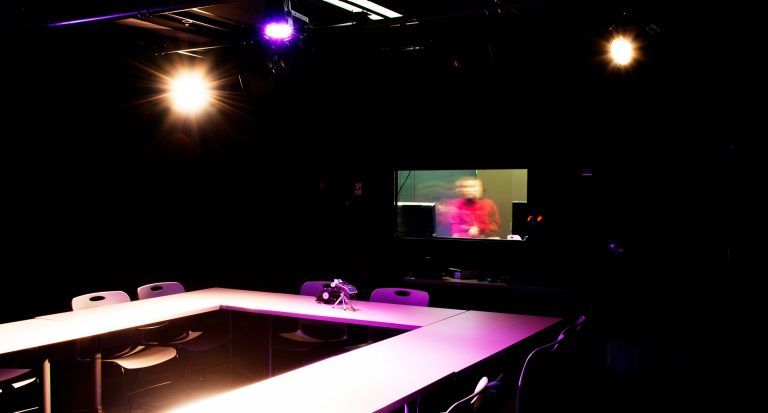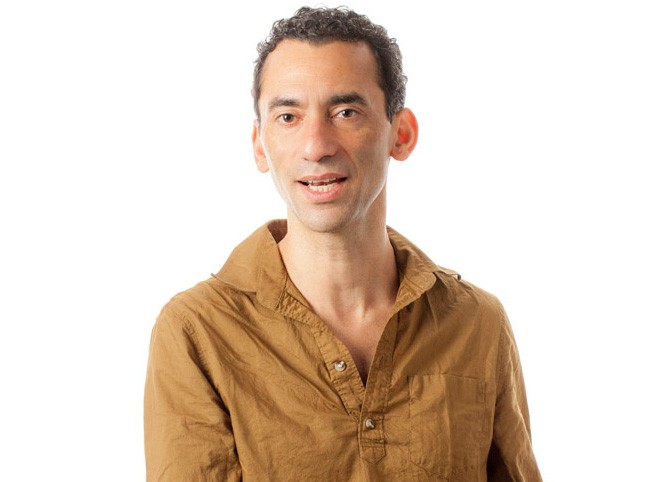Colombian refugee stories come to life at Concordia’s new Acts of Listening Lab

Luis Carlos Sotelo Castro, associate professor in Concordia’s Department of Theatre, transforms lives by turning the act of listening into a performance.
Now, the Canada Research Chair in Oral History Performance is getting set to launch his new Acts of Listening Lab at the Centre for Oral History and Digital Storytelling.
“My research has to do with people who come from sites of conflict,” he explains. “They have lots of memories to share but there are not many spaces where they can share them.”
The Acts of Listening Lab, which is funded by the Canada Foundation for Innovation, is part performance space and part innovation lab. Participants hear testimonies through an oral history performance — real-life narratives are told through an interpreter while the listener goes through three stages of immersion that mimic the environment described by the storyteller.
When Sotelo Castro started his tenure as Canada Research Chair, he flipped the script by focusing on the effects of storytelling on the listener rather than the storyteller.
“I realized that a key aspect of research on oral history for me is how to investigate those who listen to oral histories. The core is that we are dealing with narratives that may be difficult to listen to and to believe,” he says.
To this end, Sotelo Castro uses the headphones verbatim technique — in which one person gives a testimony that gets recorded and, later, a performer plays it back through headphones.
“As they listen, they deliver the testimonies verbally as if the listener was a simultaneous translator. Listeners have the sense of being directly in front of the testifier, but the person’s identity is protected,” he explains.
 Luis Carlos Sotelo Castro, associate professor in Concordia’s Department of Theatre
Luis Carlos Sotelo Castro, associate professor in Concordia’s Department of Theatre
Colombia’s reconciliation
One story being told is that of a Concordia student from Colombia who asked not to be named. Through the lab, she’s able to speak anonymously to a Canadian audience for the first time, in the voice of Ana María García Hernández, a psychologist from Bogotá completing her MA in Creative Art Therapies at Concordia.
The student’s father, a friend of Sotelo Castro’s, was killed by guerillas in the small Colombian town of La Macarena when she was 10 years old. In 2002, at the age of 15, she escaped to Canada with her mother and siblings. She says that the process of sharing her grief through another voice was difficult but rewarding in the end.
“It was the first time that I saw my history in a mirror,” she says. She goes on to liken the process of having her story told through another person to a kind of exorcism. “The experience was outside me. It doesn’t do anything inside of me anymore. It’s kind of a relief, I think.”
García Hernández, who was brought on to the project as an active listener, says the experience of conveying war testimonials using the headphones verbatim technique was both touching and scary. She translated orally from Spanish to English in real time.
She adds that the process allowed her to connect with the story in a way that she hadn’t previously thought possible.
“You’re embodying that person. You have to lend your body to another human being to hear — not just with your ears but with your whole body — whatever they are telling you, and that’s very unique,” García Hernández says. She will also be working in a support role for listeners after the lab and will be present at the launch on February 15.
Interdisciplinary dialogue though better listening
According to Sotelo Castro, innovation means bringing together professionals from different fields together with a common goal.
“It might include people from the mining industry, psychology, law or theatre. We need to think together about the problems that the stories raise — the questions, and how to talk about them.”
While the lab is performance based, its main objective is not to document the performers but the listeners, and to help them understand how to go about listening. Sotelo Castro says we have frames that guide our listening and our understanding — like our own memories and what we learn from media. The lab aims to develop workshops and exercises so that people become more aware of their listening styles and learn to listen better.
Seeing a link between the newly started Truth Commission in Colombia and Canada’s ongoing dialogue with Indigenous people, Sotelo Castro is hoping to involve First Nations communities directly in the process of welcoming Colombian and other refugees here. The idea is that refugees also get to hear what First Nations communities in Canada have gone through historically and that both groups of peoples are aware of each others’ painful past.
He also wants the lab to blossom as a shared space where artists and academics with an interest in oral history can use the facilities and make project proposals.
“I want to exchange ways of listening in different contexts, so that the different practices inform each other. Together we can come up with innovative strategies to engage different publics with issues of shared interest.”
The Acts of Listening Lab launches at Concordia’s Centre for Oral History and Digital Storytelling on February 15 from 1 to 3 p.m. in room LB-1042 of the J.W. McConnell (LB) Building (1400 De Maisonneuve Blvd. W.) on the Sir George Williams Campus.


